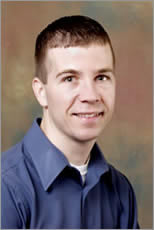UTD Neuroscientist Awarded Grant to Study How the Brain Processes Speech Sounds
By: Office of Media Relations | July 2, 2004
RICHARDSON, Texas (July 2, 2004) — A neuroscientist at The University of Texas at Dallas (UTD) has been awarded a $224,000 grant to study how the brain processes speech sounds, particularly with regard to language impairments in children.

Dr. Michael Kilgard, an associate professor in UTD’s School of Behavioral and Brain Sciences and principal investigator of the university’s Cortical Plasticity Laboratory, received the award from the National Institute on Deafness and Other Communicative Disorders. The grant covers a three-year period.
“Approximately one out of every 15 children entering elementary school in the United States has a significant developmental language impairment of unknown origin,” Kilgard said. “Studies have improved the understanding and treatment of language difficulties, but little is known about the cortical mechanisms that contribute to speech problems.”
As part of his study, Kilgard will document the response of neurons in the auditory cortex — the area of the brain responsible for hearing — to natural and modified speech sounds. He hopes his findings will influence the use and development of behavioral and sensory rehabilitation of children with language impairments.
Kilgard joined UTD in 1999. He earned a bachelor’s degree in molecular and cell biology from the University of California, Berkeley, and a Ph.D. in neuroscience from the University of California, San Francisco.
About UTD
The University of Texas at Dallas, located at the convergence of Richardson, Plano and Dallas in the heart of the complex of major multinational technology corporations known as the Telecom Corridor®, enrolls more than 13,700 students. The school’s freshman class traditionally stands at the forefront of Texas state universities in terms of average SAT scores. The university offers a broad assortment of bachelor’s, master’s and doctoral degree programs. For additional information about UTD, please visit the university’s web site at www.utdallas.edu.
Media Contact:
Office of Media Relations, UT Dallas, 972-883-2155, newscenter@utdallas.edu, or the Office of Media Relations, UT Dallas, (972) 883-2155, newscenter@utdallas.edu.





